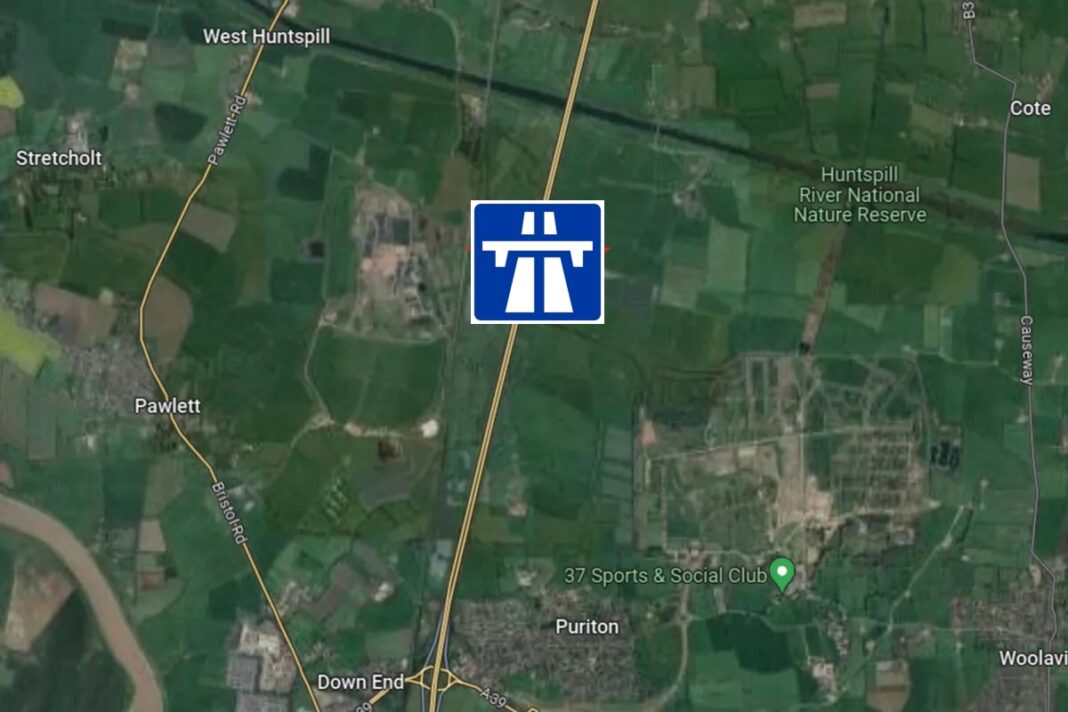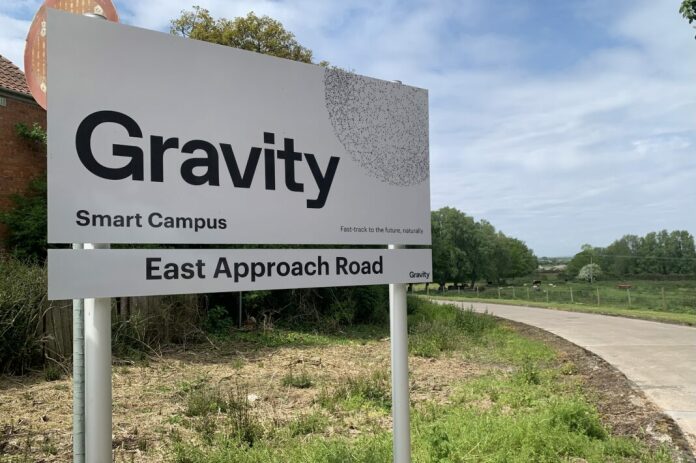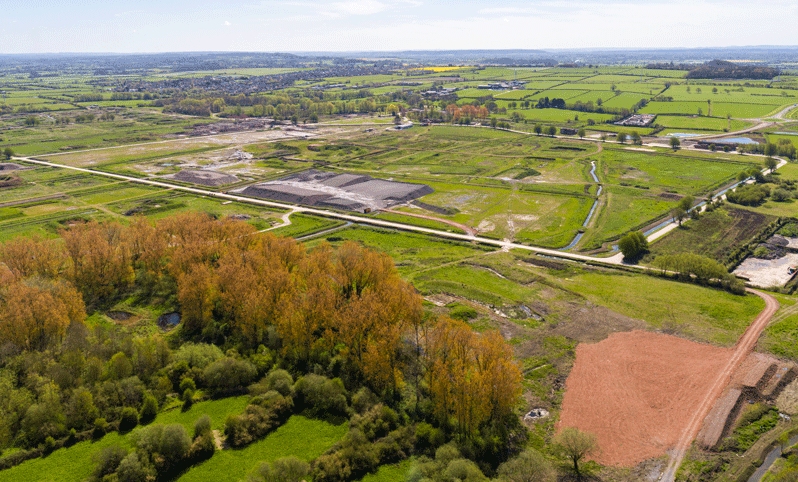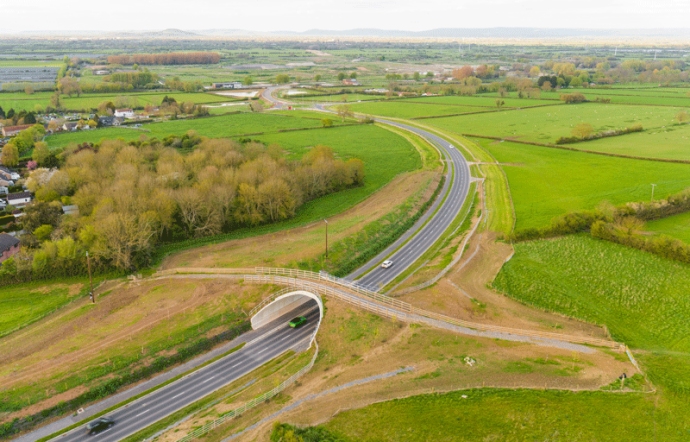A new M5 motorway junction could be constructed between Burnham-On-Sea and Bridgwater to provide a key link to Somerset’s new gigafactory.
Agratas, which is part of the Tata group, confirmed in late-February that it would be building its new £4bn gigafactory at the Gravity site between Puriton and Woolavington near Bridgwater, creating up to 4,000 new jobs.
Somerset Council committed in early-March to spend up to £150m on delivering the infrastructure needed to unlock this new development, funded through central government grants and retention of business rates from the site.
The council has now revealed more details of how this money will be invested – including the prospect of a new motorway junction and restoring a rail link into the site.

The Gravity locality investment plan came before the council’s executive committee in Taunton on Wednesday (June 5th), and included a breakdown of where the £150m would be targeted.
Nearly half of this funding – some £74m – would be spent on “strategic site access and movement”, including the delivery of a “second road connection from Junction 22A” and a spine road running through the Gravity site.
The site is currently connected to the A39 Bath Road near Junction 23, following the delivery of a £10.3m link road in 2019. But the council said that this road would not provide sufficient capacity to access the site, given the scale of production that would be undertaken once the new gigafactory is up and running.
A spokesman said: “The specification of this access road was based on the outline planning consent granted in 2017 and does not reflect the requirements or expectations for larger scale advanced manufacturing inward investment. Currently additional access requirements are likely to comprise of a new junction on the M5 (junction 22A) that would serve the site directly, as well as improvements to junction 23.”

“Both schemes comprising of works to the strategic road network (SRN) would be funded via central government. The connection from junction 22A through the main site and connecting back to the Gravity access road would, however, be locally funded.”
“This link road/ internal spine road would provide both access to Gravity and wider public benefit, providing alternative access between the A39 and the M5. The specification of this road has yet to be finalised and the indicative cost also includes associated active travel provision and drainage.”
The council has not yet specified a precise location for junction 22A, though it is likely to be south of the Huntspill River, providing the shortest route from the motorway to the Gravity site and minimising damage to both the key flood defence and the local nature reserve.
The Dunball roundabout, which links junction 23 to the A38 Bristol Road, will be upgraded into a ‘throughabout’ within the coming 12 months, funded from both the Bridgwater town deal and the government’s levelling up fund.

The council is currently awaiting the result of a £6.4m bid to the DfT to upgrade the Burnham-On-Sea M5 roundabout at Edithmead next to junction 22, as part of a wider programme of improvements between M5 and Bristol Airport.
Councillor Ros Wyke, portfolio holder for economic development, planning and assets, said: “This is a significant investment, not just in the short term but in the medium term for this council.”
“It’s exciting and will deliver huge benefits.” In addition to the new M5 junction, some of the £74m allocated to transport improvements around the planned gigafactory has been allocated to reinstating the rail link between the Gravity site and the Bristol to Exeter mainline.”
The trackbed for the original Royal Ordnance rail link remains in place, with space for a single track running over the M5 north of junction 23 – though experts estimate it would cost around £50m to reinstate the link.
Money could also be made available for new and improved bus links to Bridgwater, Burnham-On-Sea and Highbridge (and villages to the east of the complex), as well as new pedestrian and cycle links in line with the Bridgwater local cycling and walking infrastructure plan (LCWIP).

A spokesman said: “There is an opportunity to reinstate rail connection into the Gravity site for freight and potentially passengers, and this is facilitated by the approved local development order (LDO) parameters plan for the site. The focus of any investment into public transport will be on supporting sustainable options both on-site and also opportunities that provide wider locality benefits.”
“This could include therefore direct support for new or enhanced bus services both within Gravity and also connecting the site to the wider locality. Active travel investment will include pedestrian and cycle routes within the site, as well as those that will connect the site with adjoining population centres.”
“They will enable a wider choice of sustainable transport opportunities within and to the site. Current obligations within the section 106 agreement will also deliver active travel routes connecting Puriton and Woolavington.”
Planning permission for new active travel routes connecting these two villages, along with outdoor ‘fitness zones’, was granted by Somerset Council in May 2023. Of the remaining £76m within the council’s investment plan, £45m will be spent on new energy infrastructure, with a major new connection to the National Grid being delivered ahead of a new substation being delivered.
Up to £20m will be spent on “workforce development”, including a new training centre and programmes working with local schools and colleges.
Councilor Mark Healey, whose Huntspill division includes the Gravity site, added: “Agratas strike me as honourable people. They want to use local labour, they want to work with local schools – this is good for Somerset and will put us on the map nationally.”
Councillor Claire Sully, who is standing to be the new Liberal Democrat MP for Bridgwater and Burnham-On-Sea, added: “This is such a welcome development for the people of Somerset.”
“We need to ensure local people can register their interest in the new jobs.” Up to £8m will be spent on groundworks and landscaping, as well as delivering a new supply to the site and increasing biodiversity both within the Gravity campus and the surrounding area.”
The final £3m will go towards the Dunball roundabout upgrade and the delivery of the Bridgwater tidal barrier. Of the £150M that will be needed to deliver all these improvements, £55M will be provided by the Department for Business and Trade (DBT) as a non-repayable grant, with the rest coming from council borrowing.
The council will repay the borrowing by retaining all the business rates it will collect from the Gravity site, rather than having to give a portion of this to central government. Currently, it will be able to do this until 2042, when the Gravity site’s designation as an enterprise zone expires.
However, the Department for Levelling Up, Housing and Communities (DLUHC) has hinted this may be extended to 2052, giving the council more time to repay all the borrowing.
Councillor Federica Smith-Roberts, portfolio holder for communities, housing and culture, raised concerns over the impact the new gigafactory would have on the local housing market, citing the ongoing effects of the Hinkley Point C construction programme.
She said: “We already know we have a housing crisis in Somerset, with people unable to find affordable homes and being unable to access social housing. How are we going to mitigate this wonderful opportunity for Somerset?”
Ms Wyke replied: “I don’t think, at the end of the day that we’ve got a total solution – it will be made up of many elements. We do have a reasonable run-in for the amount of people on site, with 700 people in the first phase. There are more than 3,500 people on the Hinkley site who were living locally in Somerset before taking on these jobs. We will ensure there are sufficient local opportunities for individuals and businesses.”
The Gravity locality investment plan is expected to come before the full council for final approval on June 18th, reports the local democracy reporting service.
ALSO SEE:
Burnham and Highbridge could benefit from new £4bn electric battery factory







